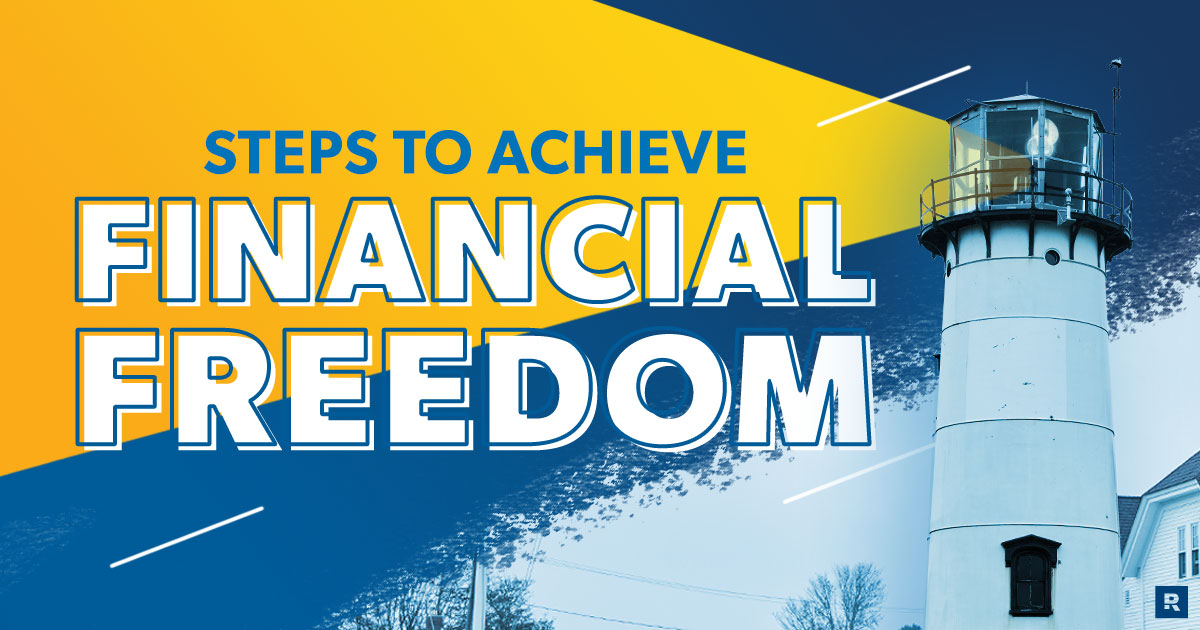15 Ways to Achieve Financial Freedom

We all know the feeling—the panic that sets into your stomach when you see the bill for an unexpected car repair. How are we going to pay for that? But what if a car repair was just an inconvenience? Instead of worrying, you pay the bill without thinking twice. A week later you’ve forgotten it even happened! That’s how little it affects your financial situation. It’s not an emergency. It’s barely a hiccup!
Do you feel that sense of relief? That’s what financial freedom feels like.
What Is Financial Freedom?
Financial freedom means you get to make life decisions without being overly stressed about the financial fallout of those decisions. That’s because you’re financially prepared for whatever life throws your way—you have no debt, you have money in the bank, and you’re investing for the future.
In other words, you control your finances instead of being controlled by them. When you have financial freedom—we prefer to say financial peace—you have options. You don’t have to wonder if your bank account can handle replacing your hot water heater or buying groceries for a single mom who just lost her job.
How to Achieve Financial Freedom
The path to financial freedom isn’t a get-rich-quick strategy. And financial freedom doesn’t mean that you’re “free” of the responsibility of handling your money well. Quite the opposite. Having complete control over your finances is the result of hard work, sacrifice and time. And all of that effort is worth it!
Market chaos, inflation, your future—work with a pro to navigate this stuff.
Here are the ways you can start achieving financial freedom today:
- Learn How to Budget
- Get Debt Out of Your Life—For Good
- Set Financial Goals
- Be Smart About Your Career Choice
- Save Money for Emergencies
- Plan for Big Purchases
- Invest for Your Retirement Future
- Look for Ways to Save Money
- Live Below Your Means
- Help Your Kids Save for College
- Pay Off Your Mortgage Early
- Make Your Health a Priority
- Get the Right Insurance in Place
- Work With a Financial Advisor
- Be Generous With Others
Ready to learn how to build a life of financial independence for you and your family? Let’s dive right in!
1. Learn How to Budget
You won’t get ahead if you don’t have a plan for your money. Instead, you’ll find yourself wondering where your money went at the end of every month! That’s not financial independence—that’s a recipe for financial disaster.
Financial freedom is impossible if you’re not living on a budget. You’ve got to tell your money where to go, or you’ll end up wondering where it went. Give every dollar an assignment before the month begins and track your spending throughout the month. If you consistently overspend or underspend in certain areas, you can always adjust the amount in those categories.
Budgeting is important to get your finances on the right track, but it doesn’t end there. Even once you achieve financial freedom, you’ll still complete a unique budget every month. No matter how much money you have, you need a plan.
No one win the big championship game by accident, and you won’t get to financial freedom by accident either. Budgeting is the first step to building wealth on purpose. Start budgeting with confidence and take control of your money today by downloading EveryDollar—it’s the world’s best budgeting app!
2. Get Debt Out of Your Life—For Good
If you have debt like credit cards, student loans or car loans, it’s time to kick it to the curb. Why? Because as long as you’re sending hundreds of your hard-earned dollars in debt payments to banks and lenders every month, you’ll never truly experience financial freedom.
Your income is your most powerful wealth-building tool. And you won’t reach your money goals if all you’ve got to work with are bits and pieces left over after you pay credit card bills and student loan payments.
Paying off your debt helps you lay a foundation to build wealth that will last. Make sure you have $1,000 saved and put aside for emergencies before you start tackling your debt. You don’t want an unexpected expense to derail your progress.
Most people feel like they got a raise when they start budgeting, so that’s good news for you. Throw all of that extra cash at your smallest debt until it’s gone. Then keep the snowball rolling. Paying off debt is hard work, but there’s nothing like the feeling of actually keeping the money you bring in every month.
Are you ready to begin your debt-free journey? Then it’s time to sign up for Financial Peace University, the course that has helped millions of people just like you get out (and stay out) of debt!
3. Set Financial Goals
Everybody dreams about achieving financial freedom. It’s a great dream! But a dream without a goal is just a wish. That’s why setting financial goals—like getting out of debt or saving up for retirement—is so important on your journey to financial freedom. They give you something to work toward!
How do you know if you have a good goal to go after? Here’s how to set goals that actually work:
- Be specific.
- Make your goals measurable.
- Give yourself a deadline.
- Make sure they’re your own goals.
- Put your goals in writing.
Let’s say you really want to get out of debt. That’s a fantastic goal to have, but that’s not enough. How much debt do you want to pay off? Is it $20,000? Good, now we’re getting somewhere! When do you want to be debt-free? How does 12 months sound? Done!
And just like that, you now have a specific, measurable goal that’s personal to you with a hard deadline attached to it: I want to pay off $20,000 worth of debt in 12 months. Now all you have to do is write it down and keep it front and center as you go after it.
4. Be Smart About Your Career Choice
As we said before, your biggest wealth-building tool is your income. So when it comes to choosing a career, there’s a lot at stake. Don’t stay stuck at a dead-end job, especially if it’s making you miserable. Find a job you enjoy that also supports your goals of financial security so you can enjoy the journey.
So, what should you look for? Here are a few things to keep in mind:
- Where do you want to be in 10 years? Start with the end in mind. Does this job make sense with your overall goals?
- Is there income-earning potential? Even if you’re not making your dream salary from the start, make sure there’s opportunity for your income to increase as your value increases.
- Can you grow? Are there opportunities for you to move up and grow personally and professionally?
- Do you enjoy the work? Don’t spend a career at a job you hate. Find something you’re passionate about that allows you to use your gifts and skills.
- Do the benefits support your goals of financial freedom? Your options for retirement savings and health insurance can dramatically affect your ability to build wealth.
Your choice of career can have a big impact on your long-term financial plan, so take it seriously. Want to learn more about discovering and doing work that gives you both a great income and big impact? Check out From Paycheck to Purpose: The Clear Path to Doing Work You Love, the latest book from bestselling author and career expert Ken Coleman!
5. Save Money for Emergencies
If your goal is financial freedom, you need a fully funded emergency fund. It acts like a buffer between you and the unexpected life events that happen to all of us, like car repairs, broken appliances and medical deductibles. That’s why you should increase your emergency fund to cover 3–6 months of expenses once you’re out of debt.
Having the cash on hand to cover an unexpected life event gives you peace of mind and is a critical part of your overall financial plan. Once you have that fully funded savings account, you’ll start to feel more flexibility in your budget. You’ll be able to say yes to shopping splurges and specialty lattes with no guilt at all!
6. Plan for Big Purchases
Since you’re not taking on debt, you’ll also need a savings plan for big purchases that aren’t emergencies. Let’s take summer vacation, for example. It’s simple! Create a line item in your monthly budget and divide the total amount your vacation will cost by the months you have to save. You’re not living in debt anymore, and that means you can enjoy your vacation instead of having a credit card bill follow you home.
With a full emergency fund and a plan to cover big purchases in place, you’ll have the financial foundation to start investing.
7. Invest for Your Retirement Future
Now that you have a plan for short-term savings, you’re ready to partner with a financial advisor who can help you make the most of your long-term investment options. The good news is the sooner you start investing, the more time your money has to grow. That’s the power of compound growth at work. Here’s how to get started:
Start by taking advantage of the tax-favored retirement accounts available to you at work, like your 401(k) or 403(b). According to The National Study of Millionaires, 8 out of 10 millionaires invested in their company’s 401(k) plan, which played a key role in their financial success.
How much should you invest? Invest 15% of your income toward retirement. And if your employer offers a match on contributions to your 401(k), take it! Don’t say no to free money.
If you have access to a Roth 401(k) at work with good mutual fund options, great! You can invest your full 15% there. But if you have a traditional 401(k), invest up to the match then invest what’s left of your 15% in a Roth IRA. If you still have part of your 15% left after maxing out a Roth IRA, go back to your 401(k).
Why is a Roth a good idea? When you invest in a Roth 401(k) or Roth IRA, the money you invest grows tax-free. That means you don’t have to pay taxes on it when you withdraw money in retirement. That’s a big benefit you don’t want to miss out on.
8. Look for Ways to Save Money
If you haven’t taken a good look at exactly what you’re spending your money on every month, it’s time to dig into your spending habits!
It’s easy to go through the hustle and bustle of life and forget about that gym membership you signed up for at the beginning of the year but haven’t used in months. Or all those streaming services you signed up for, even though you only watch a couple of hours of television each week.
Here are a few ways you can save some money right now:
- Buy generic over name brand.
- Meal plan and take leftovers to work.
- Brew your own coffee at home.
- Pause or cut subscriptions and memberships.
- Reduce energy costs.
- Use cashback apps and coupons.
And guess what? Even though they’ve achieved financial freedom, more than 93% of millionaires still use coupons to save money on their purchases.1 Turns out saving money is a hard habit to break!
9. Live Below Your Means
In other words, you’ve got to live on less than you make. This goes right along with having a budget. To reach financial freedom, you need to have self-discipline and be willing to say no to some stuff you can’t afford to buy right now so you can save more in the long run.
Listen, we’re not saying it’s bad to have stuff or want nice things. We just don’t want your stuff to have you. When you buy that car or that house with money you don’t have to impress people you don’t even like, you’ll constantly find yourself caught in the vicious cycle of debt and overspending. That’s not a recipe for financial freedom. In fact, it’s just the opposite.
10. Help Your Kids Save for College
If you’re already contributing 15% of your income to retirement and you want to start saving for your kids’ college fund, you can start by investing in an Education Savings Account (ESA).
Like a Roth IRA, the money you contribute to an ESA grows tax-free, which means you won’t pay taxes on it when it’s used to cover college expenses. Currently you can contribute up to $2,000 per year for each child in an ESA. Income limits do apply, and your investment pro can help you find out if those impact you.2
If you want to save beyond an ESA (or you don’t qualify to contribute to one), talk to your financial advisor about a 529 plan. These plans also grow tax-free! Just be aware there are some 529 plans you should avoid. Steer clear of prepaid tuition plans and fixed investment options.3
The great thing about saving for your kids’ college is that by helping them avoid student debt, you’re setting them up for financial freedom too!
11. Pay Off Your Mortgage Early
There’s a reason the average millionaire pays off their house in about 10 years.4 Think about it: What would your life look like without a mortgage payment? When you own your house (not the bank or your mortgage lender), the grass under your feet just feels different. That is freedom—financial freedom.
Making an extra house payment every quarter could help you pay off your house years ahead of schedule and save you tens of thousands of dollars in interest payments. You can use our mortgage payoff calculator to figure out how to shorten your mortgage term.
12. Make Your Health a Priority
We all know a healthy diet and regular exercise are good for your health. But what if we told you a healthy lifestyle is good for your bank account too?
There’s little debate that we have a health crisis in America today. And poor health could cost you your financial freedom if you don’t do anything to fix it. That’s because more health problems mean more doctor visits and medical bills, and that leads to higher insurance premiums.
The annual cost of treating certain diseases caused by poor diet is about $300 per person, or $50 billion nationally.5 And about 1 in 10 adults in the U.S. now owe some kind of medical debt—that’s 23 million Americans with medical debt totaling close to $200 billion.6
When you take care of your physical, mental and spiritual health, you’re also taking care of your financial health as well. In fact, another study found that if U.S. adults followed a healthy diet, reductions in heart disease, cancer, Type 2 diabetes and Alzheimer’s disease could lead to $88.2 billion in cost savings.7
13. Get the Right Insurance in Place
You might be asking yourself, What does insurance have to do with financial freedom? A lot, actually! When you look at sports teams that win championships, they don’t just focus on offense—they have a strong defense too. That’s what insurance is: It’s the defensive strategy that protects your finances.
Without the right insurance in place, one bad accident or one lawsuit could put everything you worked so hard for at risk. While budgeting, saving and investing will help you reach financial freedom, insurance helps you stay there.
Here are eight types of insurance you simply shouldn’t go without:
- Term life insurance
- Auto insurance
- Homeowners/renters insurance
- Health insurance
- Long-term disability insurance
- Long-term care insurance
- Identity theft protection
- Umbrella policy
Want some help? Your best bet is to talk to a RamseyTrusted insurance pro who can help you find the best deals for the right amount of insurance you need.
14. Work With a Financial Advisor
The idea of actively making decisions about your money and your investments may feel overwhelming. If it feels that way to you, you’re not alone.
Listen, you’ve worked hard to lay the right foundation, so don’t leave your financial future up to chance! You need the expertise of a financial advisor to help you navigate your investment options and brave the ups and downs of the stock market.
A financial advisor can help you:
- Make decisions about your investment strategy
- Rebalance your funds regularly so you minimize your risk
- Create a realistic plan for what financial independence looks like for you
- Know what investment options you have beyond retirement accounts
- Set up a withdrawal plan for your specific situation
15. Be Generous With Others
Financial freedom is about more than just being able to cover unexpected emergencies—like a car repair—without breaking a sweat. The fun really starts when you realize you can meet the needs of others. Imagine blessing a struggling family by paying for their car repair! It’s not just about you anymore—it’s about leaving a legacy!
And the best part is you don’t have to wait until you reach financial freedom to be generous. We always say to start your budget with a line item for giving—even if you’re focused on paying off debt or building your emergency fund. At that stage, your giving might look like tithes to a local church or charity. But once you’ve reached financial freedom, that’s when you can really go wild with generosity!
If you live like no one else, later you can live and give like no one else. It’s worth all the hard work it takes to get there. You’ve got this!
Connect With a Financial Advisor
With our SmartVestor program, you can find investment professionals to help you achieve your financial goals. Remember, the journey to financial freedom is a marathon, not a sprint. An expert financial advisor is the perfect partner for the journey.
Ready to get started? You can connect with a pro today!
Source link





